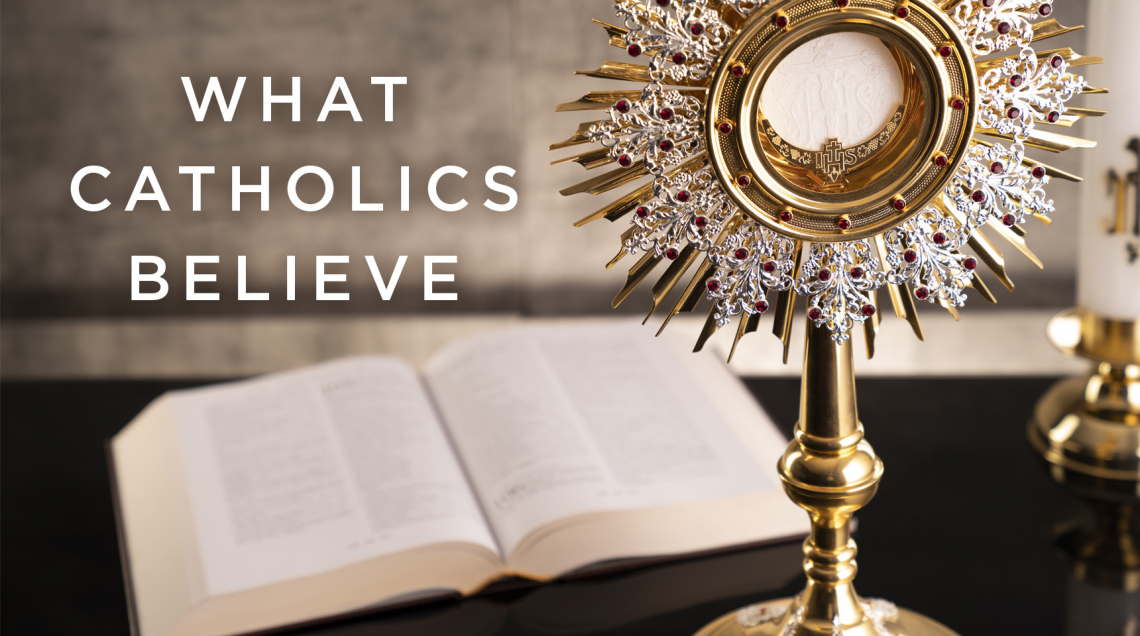What Catholics Believe - Chapter Thirty Six

Who is ‘Our Father’?
There is so much that we could say about the Our Father. For this reflection, we focus on the use of the word “Father” as a name for God
Many people have been blessed with wonderful relationships with their fathers. Others, however, have not been so fortunate. They may have difficulty with the very name “Father” as applied to God. For some, it reminds them of their difficult relationships with their own fathers or of the gaping hole in their hearts because of the fathers they never knew. For others, the word “Father” brings up memories of injustices inflicted on women by men. For such people, the word “Father” can bring up pain rather than hope. Might there be another perspective? When the Bible uses the word “Father” to describe God, what do we find?
We find that, throughout the Scriptures, the Fatherhood of God is linked to freedom and discipline. God first calls Israel “my son” in the book of Exodus, when He commands Pharaoh to “let my people go.” God is a Father who liberates from slavery. But God is also a Father who disciplines. The 40 years of wanderings in the desert, the Law of Moses, the frequent interventions of the prophets, were all means by which God worked to form His people.
We tend to see freedom and discipline as realities in tension with one another, if not opposed to one another. “Freedom,” we suppose, means “doing whatever I want.” The ancient Biblical definition of freedom is different: the ability to become who you are called to be. Freedom thus requires discipline, and good discipline yields more freedom. No athlete, no soldier, no doctor, can fulfill their vocation without a great deal of discipline. In the same way, God liberates His people from Egypt so that they might become a witness of God before the world. God’s word then offers the discipline that shows His people how to appropriate and enliven the gift of freedom they have received.
In the New Testament, Jesus frees people from sin, disease, and many other difficulties so that they might become God’s holy people. Jesus then offers discipline to sustain them on that path: the Sermon on the Mount, the command to take up our cross and follow Him, the challenge to make the Kingdom of God the “one necessary thing.” Freedom and discipline need one another. Freedom without discipline is dissipation. Discipline without freedom is slavery.
Nowhere do we see these themes interact as well, or as powerfully, as they do in a parable that Bible scholar Tom Wright calls the Parable of the Running Father – or, more familiarly, the Prodigal Son. The two sons have misunderstood this vital link between freedom and discipline and, thus, separate the two. The younger son wants his freedom without discipline – not unlike many of us today. He sees discipline, and his father, as obstacles to his freedom. He wants his inheritance now. He quickly blows it. The older son is all discipline, always doing what his father wants. However, it yields him no freedom. His heart seethes with resentment over his father and his younger brother. Neither son can understand the father.
The father in this story is utterly free. In the culture of Jesus’ time and place, the father of a family was expected to show gravitas or dignity. Fathers don’t run. They don’t get insulted by their children or negotiate with them. But this father is different. He is unfazed by the insolence of the younger son. He runs to meet the younger son when that son, humbled, returns. Thus, the father leaves his gravitas in the ditch. The father is unfazed by the insolence of the older son later but tries to persuade him to join the celebration.
This freedom, however, is impossible for anyone without discipline. It takes practice, even with the necessary help of grace, to learn that such externals as reputation and dignity don’t matter. It takes discipline to train oneself to serve what really matters. The father thus shows both utter freedom and utter discipline. He knows who he is. So, he is free to act in a seemingly undignified way as he seeks the liberation of his sons. He is not derailed by his sons’ attitude. God, as Father, is like the father of this parable. God is utterly free. Therefore, God can be truly, completely, fully, who He is. God is thus utterly disciplined, focused. Our sins and insolence do not distract Him. God offers us this same liberation and discipline, each in the service of the other. This is what it means to call God “Father.”
We as a Church are challenged to bear witness to the Fatherhood of God in a world that desperately needs it. Those of us who are given the title “Father” bear an even greater responsibility in this regard. All too often, however, we find ourselves “touchy about esteem” and “jealously asserting our authority.” We like our gravitas, thank you very much! Here we need a reminder: the Fatherhood of God frees us from our need for gravitas, enabling us to be “running Fathers,” always ready to seek the lost and to welcome them home. Then, like shepherds, we guide with loving discipline those thus freed so that they might become what they – and we – are called to be. What better gift could we offer during this Year of Mercy?
Further reading: The Catechism of the Catholic Church, 2759-2865
Scott Hahn, Understanding “Our Father”: Biblical Reflections on the Lord’s Prayer
Tom Wright, The Lord and His Prayer
By: Father Mark P. Nolette, a priest/hermit of the Diocese of Portland, resides in Pittsfield and also does part-time parish ministry at Our Lady of the Snows and St. Agnes Parishes.










